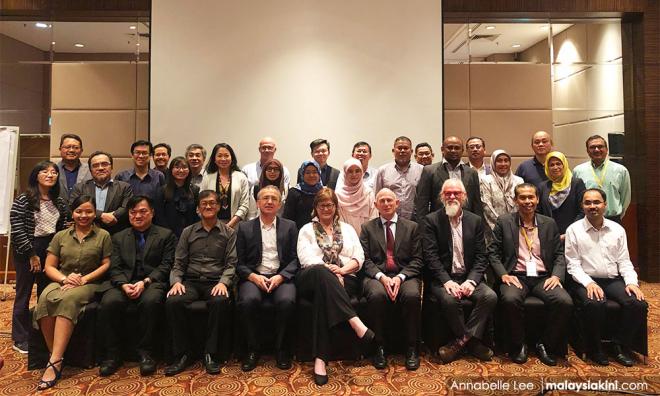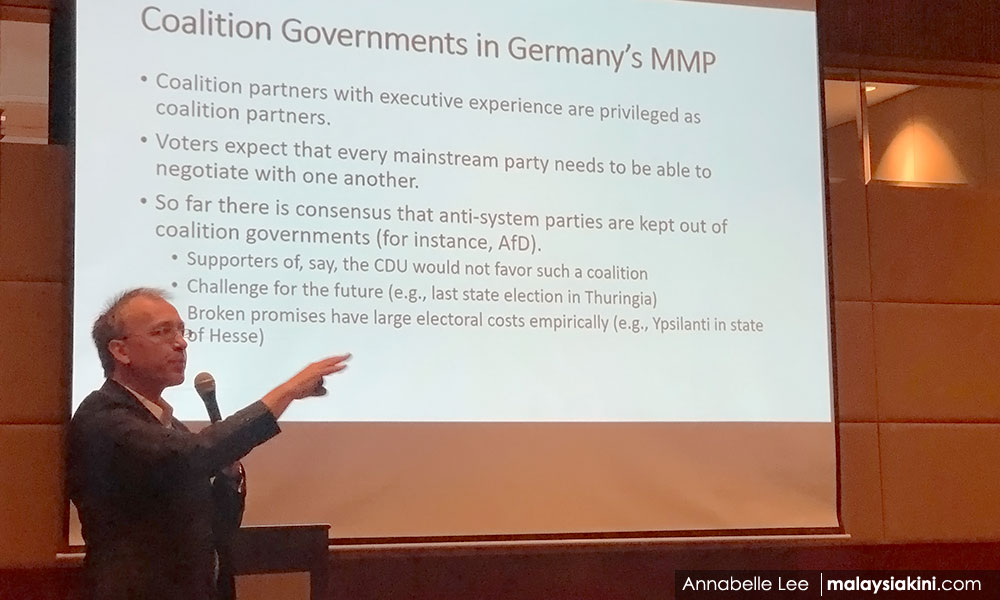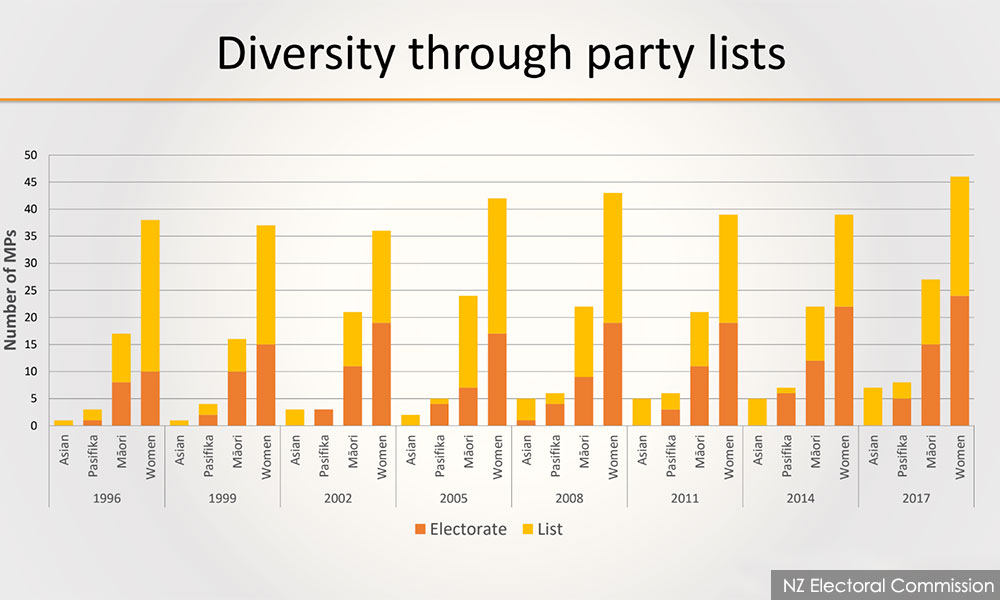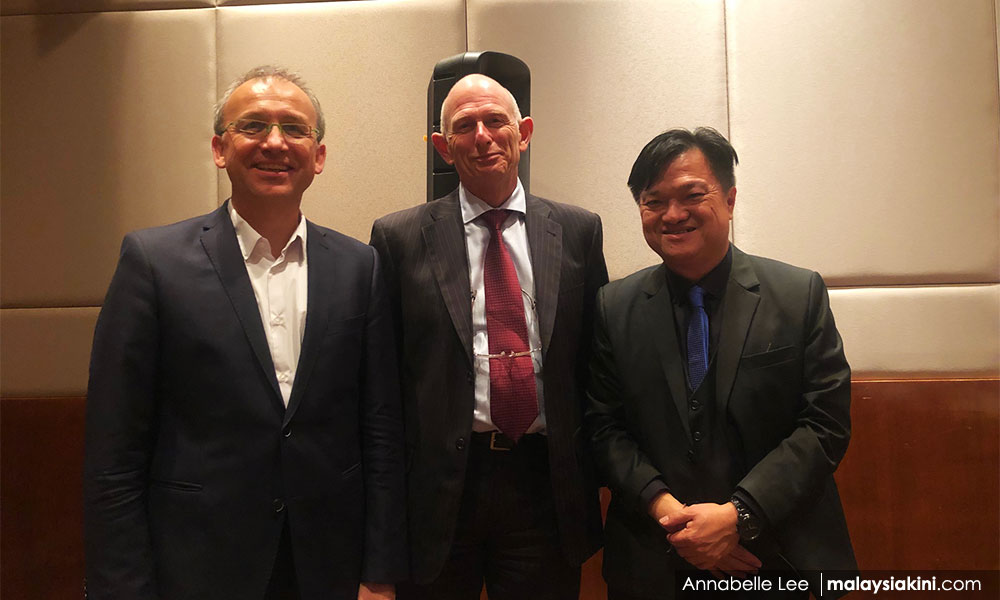
Participants at a workshop today heard how the mixed-member proportional (MMP) electoral system has helped make election campaigning in Germany more civil and issue-based.
They also heard how changing its voting system to the MMP helped New Zealand elect more women and indigenous MPs.
As opposed to Malaysia’s first-past-the-post (FPTP) electoral system, the MMP system allows voters to cast two ballots - one to choose an individual MP to represent their constituency and one to choose a political party.
The total vote-share won by each party will determine how many additional representatives it can install from its list of nominees, a mechanism called List-Proportional Representation (List-PR).

Speaking at the “MMP and Constituency Delimitation: Experiences of Germany and New Zealand for Malaysia’s Reference” workshop in Kuala Lumpur this afternoon, German political science professor Thomas Gschwend (photo) shared how this system has not allowed one party to form a government on its own, resulting in post-election coalitions.
The need for coalition governments, he contended, is what has made elections in Germany less antagonistic.
“The effect is there is less negative campaigning in elections.
“Because if those (pre-election) blocs don’t work out, if they don’t get the majority, then they need to get an additional coalition partner for coalition negotiations. And this is easier if you don’t beat this person up all the time.
“So it civilises the election campaign and focuses (it) more on particular issues... And this actually works. From this, there is already moderation going on, and the focus (is) on national policy that gets everyone better off,” said the University of Mannheim academic.
The present German government is a coalition comprising the Christian Democratic Union, Christian Social Union of Bavaria and Social Democrats.
New Zealand
Meanwhile, former New Zealand Electoral Commission chief electoral officer Robert Peden shared that voters have been more fairly represented since New Zealand implemented the MMP in 1996.
This means there is less disparity in the value of each vote, which is an issue in Malaysia.
Not only has MMP resulted in more minor parties being represented in the New Zealand parliament, but Peden also showed that the system had brought more diversity into the august house.
This was largely achieved by implementing gender and ethnic quotas through the List-PR mechanism.

“For Maori, women, Pacific Islander and Asian MPs, their representativeness in parliament are in large part achieved through the lists... and the reason for that is that parties can put prominent faces on the lists, people whom they really want to get into parliament.
“They don’t have to rely on winning a FPTP race in a constituency,” he said.
Of the 46 women MPs in the 120-seat New Zealand House of Representatives, 24 were elected through List-PR.
Malaysia
Putrajaya, through the Election Reform Committee (ERC), is presently studying a myriad of ways to improve the country’s electoral system.
Drawing from the experiences of Germany and New Zealand, ERC member and political scientist Wong Chin Huat (below, right) presented that the FPTP system discouraged moderation, especially since Malaysia has a small quantum of centrist voters and many largely monoracial seats.

“To be moderate in a society like Malaysia is electorally not profitable. Why?
“Moderation is like low-fat milk, decaffeinated coffee, diet Coke. Healthier but lacking authenticity,” he remarked.
Political realities have shaped parties to focus on ethno-religious issues, pushing away non-race-based parties like Parti Sosialis Malaysia because they were unable to gain enough support in single constituencies to win seats.
Under the MMP system, however, Wong said issue-based parties stood a better chance.
“We are actually facing issues like climate change, global warming and we are going to face greater challenges with the Industrial Revolution 4.0 and automation...
“But are the parties responding to this? No. Because the parties have to respond to ethno-religious issues
“The difference between MMP and FPTP is whether you get chances for either new parties to emerge or parties to move away from that (ethno-religious politics) so that they can win seats based on policy,” said the newly elected Engage president.
Among those in the audience today were EC commissioners Faisal S Hazis and Zoe Randhawa; Subang MP Wong Chen; Bersatu supreme council member Wan Saiful Wan Jan; and staff from the Dewan Rakyat Speaker’s office.
The workshop was jointly organised by Engage, Bersih and the ERC.
Engage is a democracy and human rights NGO focused on encouraging citizen participation. - Mkini


No comments:
Post a Comment
Note: Only a member of this blog may post a comment.